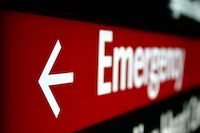New Analysis Explores the "Weekend Effect" in Emergency Departments
A new 7-year analysis from the University of Cambridge is shining light on the underlying causes of the "weekend effect" in emergency departments.

New data from a University of Cambridge-led analysis is debunking the negative implications of the “weekend effect” in emergency departments.
While previous data has detailed the “weekend effect” of increased mortality at hospitals, results of the analysis refute the notion the effect is caused by the seniority of emergency physicians.
"There has been previous research on how physician-level factors influence patient care, but our study instead focuses specifically on how seniority affects admitting patterns and in turn how this relates to the weekend effect," said investigator Stefan Scholtes, Dennis Gillings Professor of Health Management at Cambridge Judge Business School.
In an effort to explore this effect and its potential causes, investigators conducted a single center study examining emergency department attendances at Cambridge University Hospital from 2007 through 2013. Over the 7-year period, a total of 424,845 attendances from 229,401 patients were identified for inclusion in the study.
The primary outcome measure for the analysis was 30-day in-hospital death and discharge was used as a competing risk. Primary exposure for the study was day of the week of arrival. Adjusted sub distribution hazards models performed by investigators were controlled for physician seniority and multiple other confounders including calendar year, mode of arrival, triage category, referral from general practice, arrival time, prior attendances and admissions, diagnosis group, and age.
Of the 229,401 patients who made attendances during the study period, 158,396 (37.3%) were admitted to the hospital. Results of the analyses revealed there case-mix of patients who were admitted on the weekends was more ill than those admitted on a weekday. Investigators noted 2530 (6.4%) of those admitted on a weekend required immediate resuscitation compared with 6450 (5.4%) on a weekday (P<0.0001).
Further results revealed senior doctors admitted 24.8% of patients on weekdays and 24.0% on weekends. Conversely, doctors in postgraduate training admitted 61.7% of patients on weekdays and 44.2% on weekends. In regard to patients mortality, investigators noted 3497 (3.3%) patients admitted on a weekday and 1454 (3.7%) admitted on a weekend died within 30 days of admission.
In analyses controlling for confounders, the in-hospital mortality for patients admitted by junior doctors was greater at the weekend (1.11, 95% CI 1.04 to 1.18), but investigators believe observed differences are driven by fewer standard admissions on weekends compared to weekdays.
"It's clear that the admitting patterns of junior doctors changes at the weekend,” Gillings said in a release.
This study, titled “Is seniority of emergency physician associated with the weekend mortality effect? An exploratory analysis of electronic health records in the UK,” was published in the Emergency Medicine Journal.